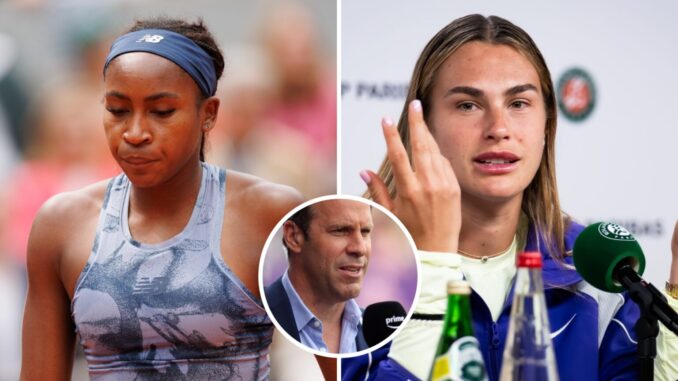
The 2025 French Open women’s final delivered a thrilling spectacle as Coco Gauff, the 21-year-old American star, battled back from a set down to defeat world No. 1 Aryna Sabalenka in a gripping 6-7(5), 6-2, 6-4 showdown on June 7 at Roland Garros. Gauff’s victory, her second Grand Slam title and first at the French Open, marked her as the first American woman to win in Paris since Serena Williams in 2015. However, the post-match narrative was overshadowed by Sabalenka’s controversial comments, which drew sharp criticism from former US Open finalist and renowned coach Rennae Stubbs, who called one particular remark “so bad” and accused Sabalenka of crossing a line into disrespect.
Sabalenka, visibly emotional after the loss, unleashed a barrage of self-criticism in her press conference, describing her performance as “the worst final I have ever played” and lamenting her 70 unforced errors. But it was her comment about Gauff’s play that sparked outrage: “Honestly, sometimes it felt like she was hitting the ball from the frame. Somehow, magically, the ball lands in the court. It felt like a joke, honestly, like somebody from above was there laughing, like, ‘let’s see if you can handle this’.” The remark, implying Gauff’s victory was more about luck than skill, was seen as dismissive of the American’s resilience and tactical brilliance in navigating the windy conditions on Court Philippe-Chatrier. Stubbs, a former doubles world No. 1 and coach to Serena Williams, took to social media to blast Sabalenka, writing, “Ugh….the tennis was not that bad. You made a bazillion unforced errors because you’re playing against the fastest player in the world who is as gutsy as hell and had better composure than you!!” Her post echoed the sentiments of fans who found Sabalenka’s words “classless” and “inappropriate.”
Gauff, displaying the maturity that has defined her rise since her 2019 Wimbledon breakthrough at age 15, responded with grace. “I mean, I don’t agree with that,” she said, seated beside her Coupe Suzanne Lenglen trophy. “I’m here sitting here [as the champion].” Addressing Sabalenka’s additional claim that Iga Swiatek, whom Sabalenka defeated in the semifinals, would have beaten Gauff in the final, Gauff countered, “No shade to Iga or anything, but last time I played her I won in straight sets. I don’t think that’s a fair thing to say, because anything can really happen.” She emphasized Sabalenka’s form, noting, “The way Aryna was playing the last few weeks, she was the favorite to win. So I think she was the best person that I could have played in the final.” Gauff’s poise stood in stark contrast to Sabalenka’s frustration, which saw her throw the ball toward a ball girl and spike it on the ground during the match.
The final itself was a test of mental fortitude. Sabalenka surged to a 4-1 lead in the first set, but Gauff’s relentless defense and adaptability to the open-roof, windy conditions turned the tide. “It was super tough when I walked on the court and felt the wind because we warmed up with the roof closed,” Gauff said. “I knew it was just going to be about willpower and mental.” Her 9-of-21 break point conversions compared to Sabalenka’s 6-of-13 underscored her ability to seize critical moments, while her 30 unforced errors were less than half of Sabalenka’s total. “I had to force her to play that way and make a lot of balls and put those balls in the court,” Gauff told Good Morning America, calling Sabalenka “a tough opponent” and “a fighter.”
Sabalenka, stung by the backlash, issued an Instagram statement on June 8, attempting to clarify her remarks. “Yesterday was a tough one. Coco handled the conditions much better than I did and fully deserved the win,” she wrote. “She was the better player yesterday, and I want to give her the credit she earned. You all know me… I’m always going to be honest and human in how I process these moments.” She acknowledged her 70 unforced errors, adding, “Both things can be true… I didn’t play my best, and Coco stepped up and played with poise and purpose. She earned that title. Respect.” Despite the apology, Stubbs remained critical, tweeting, “I love Sabalenka, but I don’t know anymore,” reflecting lingering disappointment in the Belarusian’s initial lack of sportsmanship.
As Gauff prepares for Wimbledon, where she aims to add to her Grand Slam tally, and Sabalenka heads to a grass-court event in Stuttgart before a Mykonos vacation, the tennis world continues to buzz about their rivalry. Gauff now leads their head-to-head 6-5, including wins in both their Grand Slam final clashes. Stubbs’ critique highlights the expectations for top players to display grace in defeat, especially when facing a young star like Gauff, whose composure continues to win hearts.
Leave a Reply